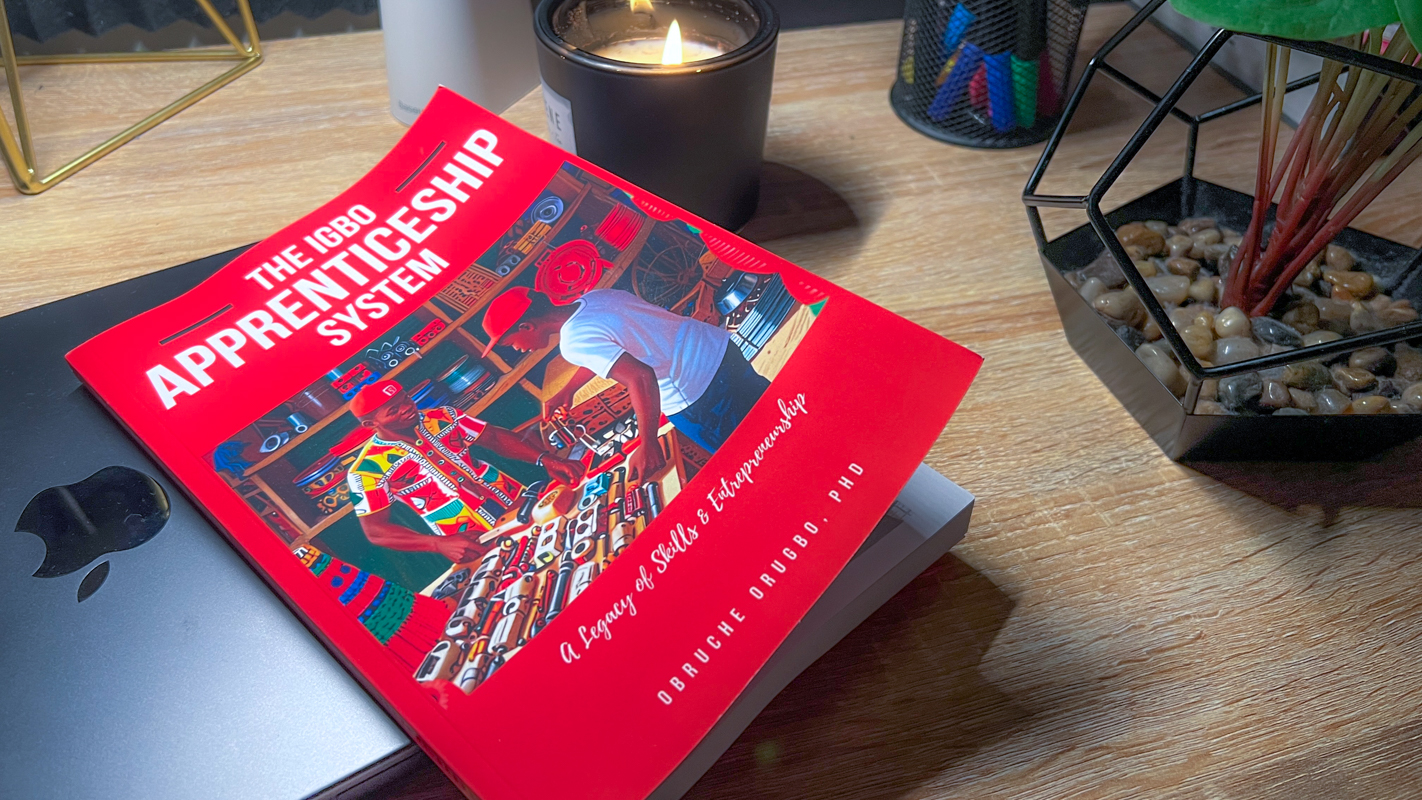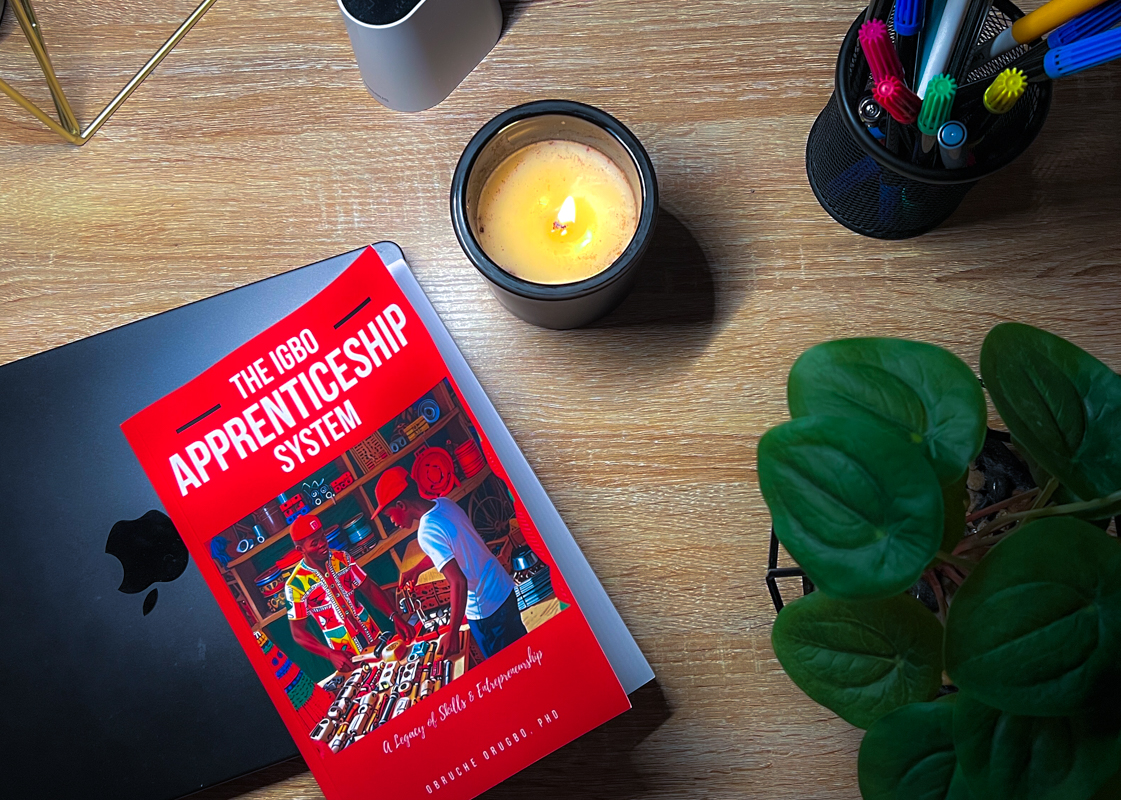The Igbo people are well-known for their wealth and entrepreneurial acumen, wherever they are in the world. Whether at home in Nigeria or abroad, the Igbo community stands out for its ability to identify problems, create solutions, and build thriving businesses. A powerful driver of this economic success is a centuries-old tradition: the Igbo Apprenticeship System, known for imparting business skills, cultivating discipline, and instilling a sense of responsibility in young entrepreneurs.
In “The Igbo Apprenticeship – A Legacy of Skills and Entrepreneurship,” Dr. Obruche Orugbo explores this rich system and its enduring legacy of creating business leaders from the ground up. The book dives into the mechanics of a system that has produced countless entrepreneurs and shares why the Igbo Apprenticeship System has sustained relevance, even in a world rapidly shaped by technology and changing economies.
The Roots of Igbo Entrepreneurship
The Igbo people have a long history of entrepreneurship, and it’s deeply embedded in their culture. This entrepreneurial spirit isn’t a recent phenomenon; it has been an integral part of the community for centuries. Dr. Orugbo begins by exploring the historical roots of this system, helping readers understand why business-mindedness is so strong among the Igbo. Rather than waiting for opportunities, the Igbo have consistently created them. The apprenticeship model, also known as “Ịgba Boi” or “Imu Ahia,” is foundational to this spirit, channeling young talent into successful trades through a structured but culturally rooted learning experience.
From a young age, Igbo children observe family members involved in commerce, learning the values of hard work and independence. This exposure leads many to join the apprenticeship system, where they can learn not only the technical skills of a trade but also the discipline and resilience required to excel. The Igbo Apprenticeship System is designed not only to provide skills but to build character. And it’s this combination of skill and character that has helped Igbo entrepreneurs achieve remarkable success across industries.
Roles and Responsibilities: The Oga and the Ikenga
A critical component of this system is the relationship between the “Oga” (master) and the “Ikenga” (apprentice). The Oga takes on a significant responsibility by investing in the apprentice’s future, often covering the apprentice’s living expenses and providing hands-on training. In return, the Ikenga agrees to serve diligently, learn attentively, and follow the Oga’s guidance. This unique relationship is built on mutual trust and a shared goal: to eventually launch the apprentice into independent business ownership.
This bond is what sets the Igbo Apprenticeship System apart. The Oga isn’t just a teacher or an employer; he’s a mentor and sometimes even a father figure to the apprentice. The dynamic between Oga and Ikenga teaches both responsibility and humility, as apprentices experience life from the bottom of the ladder, working their way up through hard work and discipline. It’s a relationship that benefits both parties, creating a pathway to success that is rooted in mutual respect and a shared vision of prosperity.
Types of Apprenticeships: Paths to Mastery
Dr. Orugbo sheds light on the different forms of apprenticeships in the Igbo tradition, each tailored to the type of trade or business. The two primary types are “Ịgba Boi” and “Imu Ahia,” each with its variations depending on the industry. These aren’t one-size-fits-all programs; they are customized based on the apprentice’s capabilities, the Oga’s field of expertise, and even community needs.
In “Ịgba Boi,” apprentices typically live with their masters, learning by closely observing and assisting them in every aspect of the business. “Imu Ahia,” on the other hand, focuses more on trade-specific skills and may not require the apprentice to live with the Oga. Both approaches ensure that young Igbo men and women gain more than just technical knowledge—they develop an entrepreneurial mindset, learning how to navigate challenges, understand the market, and manage a business.
The variety within the Igbo Apprenticeship System allows it to cater to different industries, from manufacturing and retail to agriculture and service sectors. This adaptability ensures that the system remains relevant and can produce competent business owners in virtually any trade.
Building Practical Skills and Business Acumen
Unlike many modern educational programs, the Igbo Apprenticeship System is a hands-on journey into business. Apprentices learn not by reading textbooks but by actively participating in day-to-day operations. They observe how the Oga manages customers, handles suppliers, and deals with financial transactions. This practical exposure gives them a solid understanding of the business, from the ground up.
Dr. Orugbo emphasizes how the system teaches not only trade skills but also business strategies that can make or break an enterprise. Apprentices learn how to negotiate, manage cash flow, and identify profitable opportunities. Over time, they graduate from menial tasks to more critical responsibilities, such as managing clients or handling transactions. This gradual increase in responsibility prepares apprentices to transition smoothly into running their own businesses.
For anyone interested in starting their own venture, the Igbo Apprenticeship System offers valuable insights into the importance of gaining practical experience. Rather than just theory, it emphasizes understanding a business holistically, giving future entrepreneurs the tools they need to succeed.
Life with the Oga: Discipline, Accommodation, and Cultural Values
Living with the Oga is more than just a practical arrangement; it’s a transformative experience. By staying in close quarters with their mentor, apprentices learn valuable life lessons and cultural values that go beyond business. They are taught discipline, respect, and the importance of integrity—values that are crucial in building a reputation as a trustworthy businessperson.
This arrangement also highlights the importance of cultural integration. As apprentices grow within the business, they become deeply ingrained in the Igbo values of community support and cooperation. They learn that business is not just about personal success but also about uplifting the community. Dr. Orugbo shares how the system instills a sense of responsibility in apprentices, urging them to give back and support the next generation.
Climbing the Earning Ladder: From Chores to Profit Sharing
Dr. Orugbo takes readers through the various stages of the apprenticeship journey, from initially performing chores and assisting in the business to eventually earning a share of the profits. This gradual climb up the earning ladder teaches apprentices patience and resilience. As they become more skilled, their responsibilities grow, and they start reaping tangible rewards for their hard work.
This structure also introduces the idea of delayed gratification. Apprentices understand that while the initial years may involve hard work without much monetary reward, their efforts will eventually pay off. This principle encourages them to stay focused, invest in their skills, and strive toward the goal of business ownership.
Industries Shaped by the Igbo Apprenticeship System
The Igbo Apprenticeship System isn’t limited to a single industry; it has shaped numerous sectors, including textiles, transportation, electronics, agriculture, and more. Dr. Orugbo explores some of the most common trades and how the apprenticeship model has helped these industries thrive.
The adaptability of this system allows apprentices to enter fields where they can quickly set up their own businesses after completing their training. By focusing on industries with high demand, the system not only helps individual apprentices succeed but also contributes to the growth of entire sectors, driving job creation and economic development in the region.
Collaboration and Competition: A Balanced Network
An interesting aspect of the Igbo Apprenticeship System is the emphasis on both collaboration and healthy competition. While apprentices from the same Oga or community often support one another, there’s also an element of competition that drives them to improve their skills and excel in their fields. Dr. Orugbo discusses how this balance encourages apprentices to build networks of support while also pushing each other to innovate and stay ahead in the business world.
These networks are invaluable resources, helping Igbo entrepreneurs access suppliers, secure loans, and even attract clients. Through the apprenticeship system, they learn the importance of maintaining professional relationships that benefit everyone involved.
Transitioning to Independence: The Freedom to Start Anew
At the end of their apprenticeship, young Igbo entrepreneurs are set up for independence, often with financial and material support from their Oga. This “freedom” is a celebrated moment in the apprentice’s journey—it’s when they get to take all they’ve learned and apply it to their own business. Dr. Orugbo explores the steps involved in this transition and how the system supports apprentices as they embark on their own paths.
This transition is key to understanding the Igbo Apprenticeship System’s impact. By empowering apprentices to become independent business owners, the system not only fosters economic independence but also contributes to wealth creation across the community. Many successful Igbo entrepreneurs attribute their achievements to the training and guidance they received through this system.
Economic, Social, and Cultural Impact
The Igbo Apprenticeship System goes beyond individual success stories; it has a profound impact on the community and the economy. By creating opportunities for young people to learn skills and establish businesses, the system generates employment and promotes wealth distribution. Dr. Orugbo highlights how the system helps address economic challenges in Nigeria by equipping young people with practical skills and entrepreneurial mindsets.
Beyond economics, the system reinforces cultural values such as resilience, community support, and responsibility. It fosters a culture of upward mobility where hard work and dedication are rewarded. This impact isn’t limited to Nigeria alone; Igbo entrepreneurs worldwide carry these values with them, contributing to their communities and promoting the Igbo spirit of self-reliance and industriousness.
Facing Modern Challenges
As with any traditional system, the Igbo Apprenticeship System faces challenges in the modern era. Economic changes, globalization, and technological advancements are testing its adaptability. Yet, as Dr. Orugbo notes, the system has shown resilience. While some aspects may need to evolve, the core values of mentorship, discipline, and community remain relevant. The book concludes with an insightful discussion on the future of the Igbo Apprenticeship System and its potential as a model for sustainable development.
In summary, The Igbo Apprenticeship – A Legacy of Skills and Entrepreneurship is more than a book about business training; it’s a celebration of a rich tradition that has empowered countless individuals to overcome economic limitations, create successful businesses, and uplift their communities. The Igbo Apprenticeship System teaches us the power of resilience, mentorship, and community in achieving economic independence. For readers looking to understand how a unique cultural approach can produce world-class entrepreneurs, this book is an inspiring and educational resource.
Let’s explore the book chapter by chapter, drawing insights from each section to understand what makes this system an inspiring model for entrepreneurs around the world.
Part 1: Introduction
Chapter 1: The Igbo People and Their Entrepreneurial Spirit
From the outset, Orugbo shines a spotlight on the Igbo community’s distinct relationship with entrepreneurship. The Igbo people have an ingrained belief that economic success is not just an individual endeavor; it’s a communal responsibility. This spirit, rooted in a collective approach to wealth-building, gives birth to a drive that transcends mere business—it’s a tradition of lifting entire families and communities out of poverty. This chapter sets the stage for understanding how this entrepreneurial mentality became foundational for the Igbo Apprenticeship System.

Chapter 2: A Historical Look at the Igbo Apprenticeship System
Before diving into the structure of the system, Orugbo presents a historical lens on how the Igbo Apprenticeship System developed. Emerging in the aftermath of colonial disruption, this system was a community-based response to economic marginalization and the need for self-sustenance. By embracing apprenticeships, the Igbo people established a means of financial independence that endured through generations, proving resilient and adaptable as society evolved.
Part 2: The Structure of the System
Chapter 3: Roles and Responsibilities: The Oga (Master) and the Apprentice (Ikenga)
Orugbo introduces readers to the pivotal roles within the apprenticeship framework. The “Oga” (or master) and the “Ikenga” (apprentice) form a bond that extends beyond a conventional employer-employee relationship. The Oga becomes a mentor, role model, and even a father figure, guiding the apprentice through the highs and lows of the trade. In return, the apprentice brings dedication and loyalty to the Oga’s business. Through this close-knit relationship, the system promotes both economic growth and a sense of family-like responsibility.
Chapter 4: Types of Apprenticeships: Ịgba Boi, Imu Ahia, and Variations
One of the most fascinating aspects of Igbo apprenticeships is the diversity within it. This chapter explains the different types, such as Ịgba Boi, which focuses on trade skills, and Imu Ahia, which revolves around market trading. Each form of apprenticeship caters to different business sectors, showing the flexibility and adaptability of the Igbo model in meeting various economic needs.
Chapter 5: The Indentureship Agreement: Rights, Obligations, and Expectations
Orugbo discusses the agreements that formalize the apprenticeship, outlining both the apprentice’s and the master’s responsibilities. Unlike typical employment contracts, these agreements hinge on trust, loyalty, and community values, with verbal agreements often carrying as much weight as written ones. This chapter delves into the expectations on both sides—while the apprentice commits to diligent learning and work, the Oga promises eventual freedom and support for the apprentice to start his own business.

Part 3: The Apprenticeship Experience
Chapter 6: Learning the Trade: From Skills to Business Acumen
As Orugbo explains, Igbo apprenticeships are as much about personal development as they are about learning technical skills. Apprentices are immersed in every aspect of the trade, from the nitty-gritty of daily tasks to the broader strategies of running a business. This hands-on learning approach not only teaches specific skills but also develops the resilience and quick thinking necessary for entrepreneurial success.
Chapter 7: Life with the Oga: Accommodation, Discipline, and Cultural Integration
This chapter offers a close look at the apprentice’s daily life. Living under the roof of the Oga, apprentices undergo a transformative experience beyond technical skill-building—they are taught discipline, cultural values, and the traditions of their people. Orugbo paints a vivid picture of this holistic education, emphasizing how apprentices are shaped into community-oriented individuals who respect elders, understand discipline, and value hard work.
Chapter 8: The Earning Ladder: From Chores to Profit Sharing
Orugbo details the unique earning structure for Igbo apprentices, who often start by performing basic chores. Over time, as they prove their commitment and skill, apprentices gain increased responsibility and access to a share of the profits. This progression fosters a sense of ownership and incentivizes excellence, laying the groundwork for a successful transition into business ownership.
Part 4: The Business of Igbo Apprentices
Chapter 9: Common Trades and Industries in the Apprenticeship System
Igbo apprenticeships cover a wide array of trades, from textile trading to automobile repair. Orugbo provides an insightful overview of these fields, illustrating how each trade is tailored to community needs. This diversity in business opportunities showcases the Igbo people’s adaptability and their ability to tap into various market demands.
Chapter 10: Building a Network: Collaboration and Competition Among Apprentices
Here, Orugbo examines the balance between collaboration and competition within the apprenticeship system. Apprentices, despite competing in similar trades, often share resources and knowledge, nurturing a network that strengthens the community. This mutual support not only drives economic growth but also builds lifelong relationships and business networks that extend far beyond the apprenticeship period.
Chapter 11: Transitioning to Independence: Setting Up Your Own Business
After years of dedicated learning, apprentices reach the critical juncture where they step out on their own. In this chapter, Orugbo explains how the Igbo system facilitates this transition. The master provides financial support, known as “settlement,” to help apprentices launch their businesses, honoring a promise that began at the start of the apprenticeship. This support system helps new entrepreneurs start with a sense of security, reinforcing the Igbo commitment to communal success.
Part 5: The Impact of the System
Chapter 12: Economic Benefits: Entrepreneurship, Job Creation, and Wealth Distribution
This chapter is particularly compelling for those interested in economic development. Orugbo highlights how the Igbo Apprenticeship System is a powerful driver of job creation and wealth distribution within Nigerian communities. By equipping young people with business skills, the system ensures they are productive members of society, breaking the cycle of poverty and unemployment in countless communities.
Chapter 13: Social and Cultural Impact: Values, Community, and Upward Mobility
Beyond its economic contributions, the Igbo system shapes social values, strengthening the bonds of community and providing upward mobility for disadvantaged individuals. Orugbo emphasizes how the apprenticeship cultivates a mindset of resilience, generosity, and mutual support, ensuring that each entrepreneur gives back to the community that nurtured them. This model, deeply rooted in social responsibility, stands as a blueprint for community-focused entrepreneurship.
Chapter 14: Challenges and Adaptations in the Modern Era
As the world changes, so too does the Igbo Apprenticeship System. This chapter addresses modern challenges, from urbanization to the influence of technology. Orugbo doesn’t shy away from discussing the obstacles—migration, educational shifts, and the influence of digital entrepreneurship—but he also explores ways the Igbo system is evolving to remain relevant, adapting its values and practices to the demands of contemporary society.

Part 6: Conclusion
Chapter 15: The Igbo Apprenticeship System: A Model for Development?
Orugbo presents the Igbo system as more than just a cultural tradition; he proposes it as a model for global development. With its focus on skills, discipline, and community support, the apprenticeship system offers a blueprint for nations seeking sustainable approaches to youth employment and poverty alleviation. The structure, rooted in mutual trust and community values, has the potential to inspire similar frameworks in other countries.
Chapter 16: The Future of the System: Continuity and Change
The book concludes by addressing the future of the Igbo Apprenticeship System. Orugbo considers the dual forces of continuity and change, acknowledging the challenges the system faces while expressing optimism for its enduring legacy. The adaptability of the system, coupled with the community’s dedication to preserving its core values, suggests that it will continue to thrive and evolve for generations to come.
Final Thoughts
The Igbo Apprenticeship: A Legacy of Skills and Entrepreneurship by Obruche Orugbo is more than a book on business—it’s an exploration of a cultural tradition that combines economic, social, and ethical dimensions. By examining the nuances of the Igbo system, Orugbo sheds light on how the apprenticeship framework has become a cornerstone of entrepreneurship and personal development. The system’s combination of skill-building, mentorship, and community support offers lessons that resonate beyond Nigeria’s borders. For readers interested in the intersection of culture, economy, and resilience, this book is a fascinating look into a legacy that continues to empower individuals and uplift communities.
